探讨ASO策略之选择正确的关键字(1)
作者:Szilard Szasz-Toth
为你的应用选择正确的关键字是实现成功的重要步骤。不幸的是,现在还有没哪一项工具能够让你从这种庞大而无趣的调查工作中解放出来。市场上已有超过150万款手机应用,并且每天都有不少新产品冒泡,应用开发者必须特别关注应用商店优化策略(ASO),尤其是关键字的优化。
我们将在本系列博文中解释如何为应用挑选合适的关键字,并进行简单易学的引导。
在本系列文章的第一部分,我们将叙述如何为你的应用找到相关的关键字。第二部分则将概述基本的关键字选择过程,第三部分将展示一个选择更优化关键字列表的复杂过程。
我们将根据自己的项目为您提供现实案例。优化关键字可能对你的下载量产生极大的积极影响。我们当前数据显示,我们的下载量数据随着最近更新内容而显著增长。但要记住执行ASO也需要时间。
不要临时抱佛脚
当你开发自己的首款游戏时,你可能对ASO还不甚了解,因为你还有其他更多需要操作的事情(游戏邦注:例如发布游戏,或者修复所有的漏洞)。多数开发者是在开发周期的末期才偶然注意到ASO。我们直到最后一刻,也就是提交应用之前才进行自己的“关键字调查”。在我们游戏发布之前几天/几周,我们有许多其他问题需要考虑(修复漏洞,发布载入页面,设置社交媒体网页,编写应用描述,联系媒体等)。关键字优化一直处于我们的任务列表,但我们却一直将其后延。
我们在寻找合适的关键字上所花的时间甚少,这可能让我们损失了大量潜在下载量。据尼尔森数据显示,63%应用下载量源于应用商店搜索行为。所以要确保你在关键字调查上下了足够的功夫。
挑选关键字的3个简单步骤
1.创造一个关键字库
在你开始为应用创造潜在关键字库之前,必须熟悉一些不同ASO网站的基本术语。
*关联性:即某个特定关键字与你的应用和目标用户的相关性。不相关的关键字不会产生转化率。
*难度(排名):某一特定关键字的竞争激烈程度。这个值更高意味着它极难跻身前列排名。
*流量(热门度):特定关键字有多抢手,例如它的搜索量有多高。
1.1判断具有关联性的关键字
只使用那些与你的应用和用户高度相关的关键字。永远不要使用那些看似具有排名优势,但却与你的目标用户毫无瓜葛的关键字。
假设你开发的是一款数学游戏,并将关键字定义为“游泳”,这个关键字具有相对较好的特征,相当出色的中级流量和较低的难度。
基于以上特征,你可能会认为这个关键字是个轻松的目标,尽管它与你的应用毫不相关。
现在想象一下你是一位用户,正在检索传授游泳技巧的应用。此时有一款数学应用出现在前十个搜索结果中。你会下载这款应用吗?可能不会。如果用户花时间进行搜索查询,他们会进行精确查打,并且极不可能下载一款不相关的应用(这是实现转化的障碍)。只有具有关联性的关键字才能产生转化率。
那么你又该如何为自己的应用找到关键字?
1.1.1分析竞争对手的关键字
我们一般是通过分析头号竞争对手的情况来判断具有关联性的关键字。如果你掌握了ASO的要领,你就应该相当了解自己的潜在用户和竞争对手分别是谁(如果你现在还不知道自己的市场在哪,就得先花点时间弄清楚了)。
了解潜在相关性的关键字,可以先从收集主要竞争对手的关键字入手。要找到你的主要竞争对手,你可以浏览相关应用商店分类排行榜(我们的相关分类是教育、游戏/教育或儿童)。你不必手动逐个浏览不同分类的热门应用,可以使用App Figures的Top Apps工具,它可以用极为便利的方式同时展示多达三个分类的热门排名应用。
除此之外,还要搜索一些较为普遍但却极具关联性的字段(游戏邦注:例如“数学”或“数学游戏”)。App Annie就有一个很棒的关键字排名工具,它可以帮助你快速鉴别一些竞争对手。
另外,你还应该查看一下appnique的“推荐竞争对手”列表以及Sensor Tower的“追踪竞争者”工具。
现在你已经找到了一些排名靠前的竞争对手,是时候找到他们的关键字了。Sensor Tower的Keywod Spy就是发现竞争对手关键字的强大工具。这一工具不但可以让你看到竞争对手的关键字,还能让你看到自己的关键字与之重叠的情况。
注意:Sensor Tower所提供的关键字列表并不一定要与竞争对手实际提交给应用商店的关键字一样。目前它还无法直接查询到竞争对手的关键字。Sensor Tower可能是利用应用商店搜索API的一系列关键字再根据排名结果猜测出应用的关键字。
另一个找到竞争对手关键字的有用工具是Straply,它可以让你看到竞争对手的产品及其关键字。
在这个阶段你的主要目标就是创造一个含有广泛潜在关联性的关键字库。你可能会发现不同ASO工具所提供的关键字并不会全部与你的应用具有相关性,所以你得手动挑选最终候选者。最简单的方法就是将它们粘贴到Google Drive表格中并与团队共享。
1.1.2其他判断关联性关键字的方法
应用商店名称
许多应用在自己的名称中就含有一些最重要的关键字,所以名称是一个重要的切入点。总体来说,在你的应用名称中添加高流量、高难度关键字是一个不错的方法。
应用商店描述
浏览主要竞争对手的应用描述。有些应用可能会在描述中包含潜在相关的关键字(尤其是在特征列表中)。但要清楚苹果App Store算法很可能不会将应用描述中的文字列入排名考虑因素。
应用商店评价
检索你的应用和竞争对手产品的高分评价中的关键字。先从5星评价入手,因为它们更可能包含一些积极的关键字。这个过程非常耗时,所以我们建议只有在你执拗于鉴别足够的关键字这种情况下才参考这种做法。市场上还有许多可以自动化处理这一过程的工具,比如Sensor Tower的Review Analysis工具(目前只推出企业版本)。
谷歌趋势图
如果你想知道与某个基本查询相关的检索查询量,就可以使用谷歌趋势图。以我们使用的“数学游戏”这个字段作为基础趋势,并将其与“数学运动”和“数学训练”的查询量进行对比。
对“数学运动”感兴趣的检索几乎为0,这表明这个关键字可能并不是很成功。除此之外,谷歌趋势图还可以为你提供一些关键字建议。
Google AdWords Keyword Planner
这是一个实施基本关键字检索的可靠来源。Keyword Planner将为你提供与检索量和相关关键字有关的有用信息。
苹果App Store相关关键字
苹果目前正在试验一个新的应用商店功能。当你进入搜索查询时,苹果会展示相关关键字(目前仅向特定用户开放,希望不久可以全面开放)。
辞典
这听起来有点老套,但如果你真的想为特定关键字找到不同的变体,不妨去翻翻辞典。如果运气够好的话,就可能得到一些很好的建议。
1.2获取关键字数据
现在你已经编撰了一个相关关键字库,你必须获取特定应用商店数据。许多不同的ASO工具都呈现关键字流量和关键字难度值。这个步骤非常关键,例如Google Keyword Panner所提出的高检索量关键字,在应用商店环境中可能具有截然不同的特征(例如,网络vs移动设备的不同检索行为,网站vs应用的不同排名/竞争情况等)。
在接下来的步骤中,你就要获取每个关键字的流量和难度特征了,这一点甚为关键。在转移到下一步之前,你可以删除一切零流量的关键字(或者将这些关键字转移到一个待定列表,因为它们在未来某一时间可能又会获得流量)。根据你的游戏类型(iPhone、iPad或通用版)以及你的ASO工具的可用信息,平均一下你的iPhone和iPad得分,从而获得一个合计难度/流量数字。
总结
我们已在本文向你示范了如何判断具有关联性的关键字(记住,具有关联性的关键字才能产生转化率!)。不幸的是,现在还没有哪一款工具可以替你包办好一切,但却有不少工具可以在你的调查过程中派上用场。找到绝佳关键字的关键就在于深入了解你的市场。你越了清楚自己的潜在用户和竞争对手,就越可能得到更好的关键字库。执行ASO策略需要时间,所以不要寄希望于一蹴而就。(本文为游戏邦/gamerboom.com编译,拒绝任何不保留版权的转载,如需转载请联系:游戏邦)
App Store Optimization: Selecting the Right Keywords (Part 1)
by Szilard Szasz-Toth
Selecting the right keywords for your app is crucial for your success. Unfortunately, there is no single tool out there that can spare you from doing extensive and tedious research. With over 1.5 million mobile apps and a steady inflow of new titles every day, app developers need to pay special attention to app store optimization (ASO), particularly keyword optimization.
In this series of posts we will explain how to select the right keywords for your app and present an easy-to-follow guide.
In the first part of this series we will describe how to find relevant keywords for your app. Part 2 will outline a basic keyword selection process, which should get you started and function as an easy to follow guide. In Part 3 we will present a more “complex” procedure to choose an even better and improved keyword list.
Whenever possible, we will provide you with real-life examples from our own project. Optimizing your keywords can have an incredibly positive effect on your downloads. Our current statistics indicate that our download numbers increased significantly with our last update. But keep in mind that ASO takes time.
Don’t wait until the last second
When you develop your first game you’ve probably not read too much about ASO, because you have so many other things to worry about (launching your game, for example, or fixing all those nasty bugs). Most developers (including us) come across ASO at a very late stage in their development cycle. We did our “keyword research” (if you can even call it that) at the very last second, right before our app submission. In the last couple of days/weeks prior to our game launch we had all sorts of other problems to worry about (fixing bugs, launching our landing page, setting up social media pages, writing the app description, contacting press, etc.). Keyword optimization has always been on our todo list, but we constantly pushed it back.
We ended up spending too little time on finding the right keywords, which probably cost us a lot of potential downloads. According to Nielsen, 63% of mobile app downloads originate from app store search queries (The Mobile Media Report). So make sure to spend enough time on researching your keywords. ASO takes time!
A Simple 3-Step Keyword Selection Process
1. Create a keyword pool
Before you can start to create a potential pool of keywords for your app, you need to familiarize yourself with some basic terms used across different ASO sites.
Relevance: How relevant is a specific keyword for your app and target audience. Irrelevant keywords will not lead to conversions.
Difficulty (Ranking): How intense is the competition for a specific keyword. A higher value generally indicates that it is very hard to rank in the top spots. Check out this great article about Determining Keyword Difficulty to learn more about difficulty.
Traffic (Volume, Popularity): How popular is a particular keyword, i.e. how high is the search volume.
1.1 Identify relevant keywords
Only use keywords that are highly relevant to your app and audience. Never use keywords that seem easy to rank for, but are irrelevant to your target audience.
Let’s say you have developed a math game and have identified the keyword “swimming”. The keyword has relatively good characteristics, fairly good mid-range traffic and low difficulty:
Based on the above characteristics you might believe that this keyword is an easy target, even though it has no relevance to your app.
Now imagine you are a user searching for an app to learn how to swim. A math app will pop up as one of the first ten search results. Would you download that app? Probably not. If a user is spending the time to type in a search query, she is looking for something very specific and will most likely not download an unrelated app (high barrier to conversion). Only relevant keywords lead to conversions!
But how should you find relevant keywords for your app then?
1.1.1 Analyse Competitor Keywords
To identify relevant keywords we usually start by analysing our top competitors. If you get to the point of ASO, you should already have a pretty good picture of who your potentials customers are and who you are competing with (if you don’t know your market by now, you should spent some time thinking about that first).
To get a good idea of potentially relevant keywords start by gathering the keywords of your main competitors. To find some of your main competitors, you can skim the top charts of your relevant app store categories (in our case, the categories Education, Games/Educational or Kids). Instead of manually screening the top apps in different categories, you could, for example, use App Figures’ Top Apps tool, which is a very convenient way to display top ranked apps in up to three categories side by side.
In addition, search for some general, but highly relevant search terms (e.g. “math” or “math game”). App Annie has a really great keyword ranking tool that should help you identify some competitors quickly.
App Annie Keyword Rankings
Additionally, you should also have a look at appnique’s Suggested Competitors list and Sensor Tower’s Track Competitors tool:
Appnique’s Suggested Competitors tool
Sensor Tower’s Track Competitors tool
Now that you have found some top ranking competitors, it’s time to find their keywords. A great tool to discover some of your competitor’s keywords is Sensor Tower’s Keyword Spy. This tool not only shows your competitor’s keywords, but also shows overlaps with your own keyword list:
Sensor Tower’s Keyword Spy
Note: The keyword list provided by Sensor Tower is not necessarily identical to the actual keyword list submitted to the app store. It is currently not possible to directly query competitor’s keywords. Sensor Tower probably queries the app store search API with a set of keywords and guesses the app keywords according to the resulting rankings.
Another useful tool to find some of your competitor’s keywords is Straply. Straply shows you competing apps and their keywords:
Straply – Competing Keywords
Your main goal at this stage is to create a very broad pool of potentially relevant keywords. You will probably notice that not all keywords provided by the different ASO tools will be relevant to your app, so you will always have to manually pick the final candidates. The easiest way to keep track of all your keywords is to paste them into a Google Drive spreadsheet and share that across your team.
1.1.2 Other ways to identify relevant keywords
App Store Titles
Many apps include some of their most important keywords in their app title, so titles are a good starting point to get some clues. In general, it is a good idea to add high traffic, high difficulty keywords to your app title (like “math” or “game”).
App Store Descriptions
Skim the descriptions of your main competitors. Some apps may include potentially relevant keywords in their app description (particularly in their feature list). But be aware that the Apple App Store algorithm does (most likely) not take the words of the app description into account for ranking purposes.
App Store Reviews
Search the top rated reviews of your app and your competitor’s apps for relevant keywords. Start with 5-star reviews, because they are more likely to include positive keywords. This process is very time consuming, so we would only suggest to use reviews if you are stuck identifying enough keywords. There are tools out there that automate this process, like Sensor Tower’s Review Analysis tool (only available in the enterprise version, though).
Google Trends
If you want to get a rough indication of the volume of a search query in relation to a base query, you can use Google Trends. In this example we used “math game” as the underlying base trend and compared the queries “math exercise” and “math practice”.
The search interest for “math exercise” is close to zero. This is a strong indication that this keyword will probably not be very successful. In addition, Google Trends offers you keyword suggestions.
Google AdWords Keyword Planner
A very viable source to conduct some basic keyword research. The Keyword Planner will provide you with useful information about search volumes and related keywords. There are tons of tutorials out there to use this tool.
For example: How to do Keyword Research the Smart Way: Targeting Interest and Intent
Apple App Store Related Keywords
Apple is currently experimenting with a new app store feature. When entering search queries, Apple will display related keywords (currently only available to certain users, but should hopefully be rolled out soon).
Thesaurus
This may seem a little old-school, but if you are trying to find different alternatives to a specific keyword, a thesaurus is a good starting point. If you are lucky, you may end up with some good suggestions.
1.2 Get keyword data
Now that you have compiled a pool of relevant keywords you need to get keyword specific app store data. Many different ASO tools show you at least keyword traffic and keyword difficulty values. This step is very important, because high volume keywords suggested by Google Keyword Planner, for example, may have completely different characteristics in an app store environment (different search behaviour web vs. mobile, different ranking/ competition of websites vs. apps, etc.).
For the following steps it is crucial that you get traffic and difficulty characteristics for each keyword (e.g. via MobileDevHQ or Sensor Tower). Before moving on to the next step, you can delete all keywords that have zero traffic (or better move those keywords to a watchlist, because they may gain traffic again at some point in the future). Depending on the type of your game (iPhone/ iPad only, universal) and the information available in your ASO tool, you may also want to average your iPhone and iPad scores to get an aggregated difficulty/ traffic number.
Wrapping it up
In this first part we have showed you how to identify relevant keywords (remember, only relevant keywords lead to conversions!). Unfortunately, there is no single tool out there that will do all the work for you, but there are many tools that will help you in your research process. The key to finding great keywords is to have a deep understanding of your market. The more you know about your potential customers and competitors, the better your resulting keyword pool. ASO takes time, so don’t expect to hit a home run with your first attempt.(source:gamasutra)
上一篇:如何正确理解游戏中的付费货币概念
下一篇:分享处理音频谜题设计的方法

























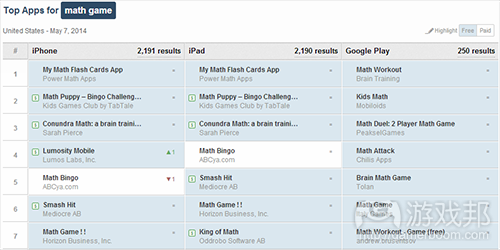
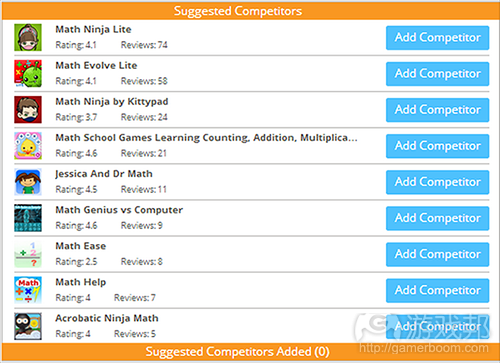
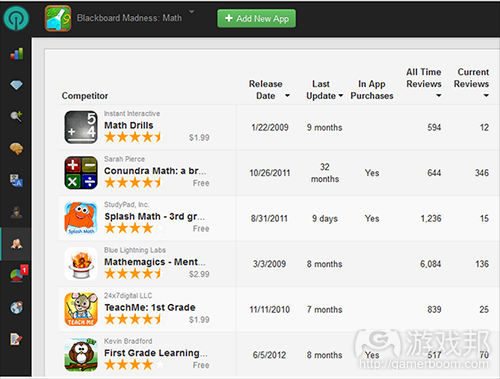
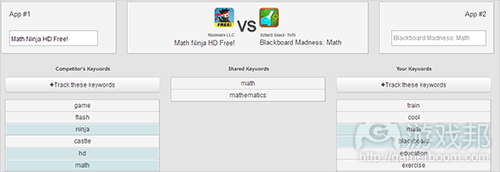
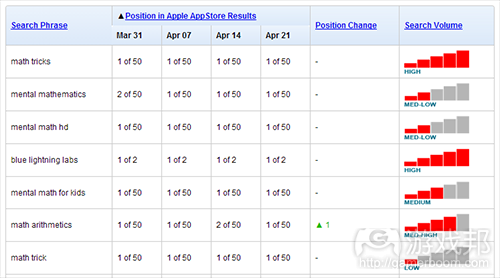
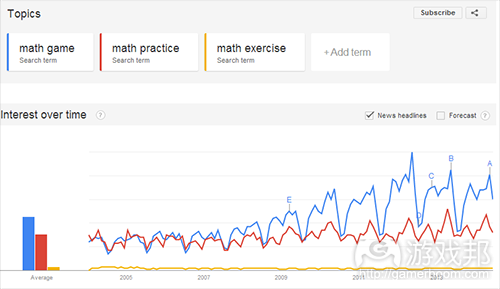














 闽公网安备35020302001549号
闽公网安备35020302001549号